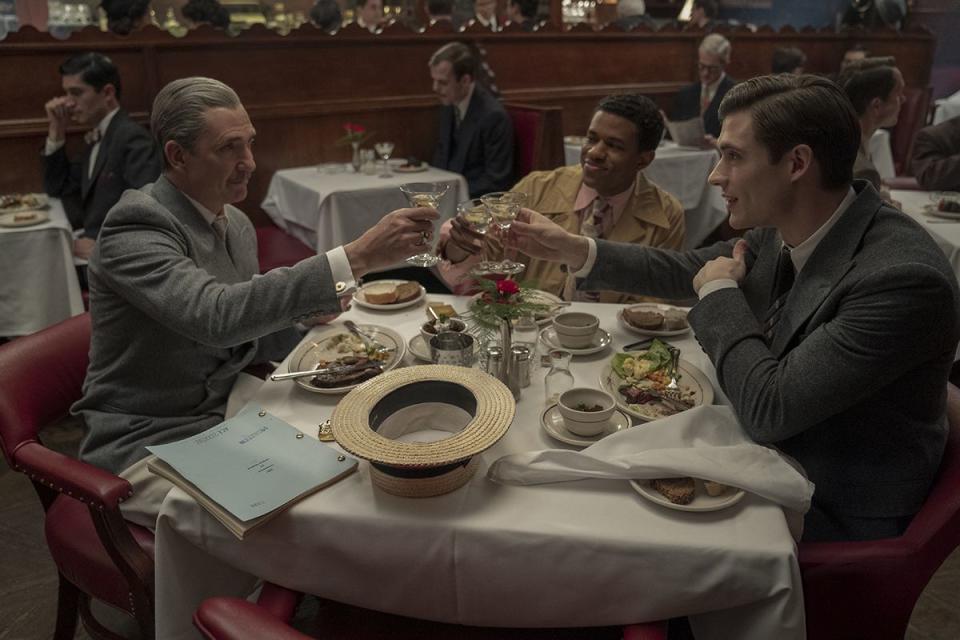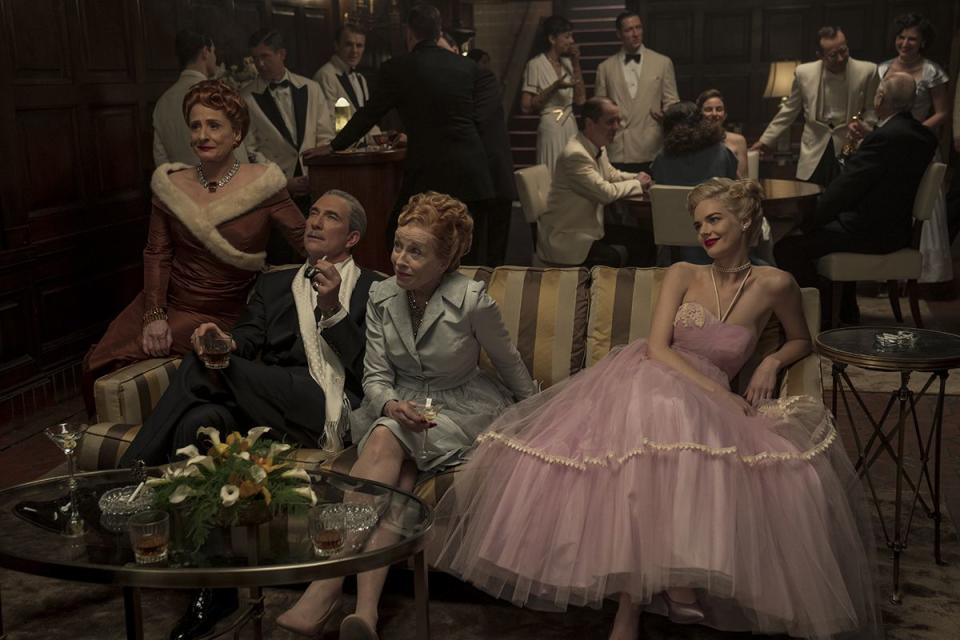How Hollywood Star Dylan McDermott Found Inspiration for His Scandalous New Role

Dylan McDermott has gone to great lengths for Ryan Murphy. The actor, who’s a regular in Murphy’s series, including American Horror Story and The Politician, has played a psychologist living in a haunted house and not one but two crazed killers in programs by the powerhouse writer and producer. But their collaboration on the new Netflix series Hollywood, premiering May 1, might be the strangest of all—in no small part because this time, some of the wildest parts of the story are true.
Hollywood is a stylish, magical reimagining of Tinseltown’s post World War II history. At its center is Jack Castello, a young actor looking for his big break in L.A. Instead of immediately finding himself on the silver screen, however, he ends up working at a gas station run by McDermott’s Ernie—one that’s awfully similar to the real-life station staffed by the late Scotty Bowers, who claimed to have run a sort of brothel catering to the Hollywood elite out of the establishment.

As the emotionally charged story progresses, a kind of alternate history of Hollywood’s golden age emerges; yes, there are real people—like Rock Hudson, Hattie McDaniel, Henry Willson, and Vivien Leigh—portrayed, but they’re mixed in with fictional (and lightly fictionalized) characters all racing to create an imaginary blockbuster, and ultimately offering a what if view of moviemaking history. Here, McDermott shares what Hollywood heroes he used as inspiration for the role, and why he’ll never look at a gas station the same way again.
You’ve been part of other Ryan Murphy series, like American Horror Story and The Politician. How did you get involved in this one?
I was at the Vanity Fair Oscars party and saw Ryan there, and he said, “I’m writing you a part. I’ll be in touch.” Anytime that happens, it’s a wonderful thing. Ryan and I have been working together for 10 years now, and anytime he calls and asks me to do something, I’m there. This project is really special. It started off a story about Hollywood and the sexual escapades there in the 1940s, and my character has a gas station where people can come in, say a secret password, and go off and have a sexual encounter with one of the guys who works there. So, I play someone who’s an actor, a producer, and a bit of a pimp all rolled into one.
You’ve had such off-the-wall parts in these series. When he says, “I’m writing you a part” it must be kind of nerve-wracking.
I’m past the nerves! I’m more excited about what it could be, since the characters are always so vastly different. Most people cast you as one thing, and I could have easily always been the guy from The Practice. I struggled with that for a bit, but ultimately it was up to me to change people’s minds. Ryan helped that cause a great deal; he provides these incredible characters, and his imagination just never stops.
This series is different in that it has aspects that are based in reality. Did you do research for the part?
I certainly watched the documentary on Scotty Bowers and got useful information out of that. I also used Clark Gable as my muse for this role. So, between the information I had from watching great movies from the 1940s, what was in my own imagination, and what was on the pages of the script, it all came together. That’s the great thing about collaboration, whatever comes out can be magical and I certainly feel that’s happened on this show. There’s nothing like this on television, that’s for damn sure.
Part of the storyline of the series is about actors waiting to get their big break. Does working in Hollywood today look anything like it did then?
There’s one thing that’s not so different: waiting around is still a big part of being an actor. You’re always waiting for the phone to ring, for an offer to come, for a meeting, for an audition, for some bite that will change your life. Maybe now we’re waiting in coffee shops for the phone to ring instead of waiting at the studio gates. One thing I do think has changed is the prejudice shown in the series, and that’s a great thing and something the show celebrates.

With this mix of real and fictional characters, did you feel like you had to portray Ernie as close to Scotty Bowers as possible?
I made up my character based on various muses: Scotty Bowers, Clark Gable, people I’d grown up with. You never know what goes into the concoction required to create a character. I stole a little bit of information from each of those people, so eventually I could get out of the way and the character could just take over.
This season looks at one year in the lives of these specific people. Is there another era in moviemaking that you think would be interesting to give the same treatment?
If it gets picked up for another season, we can explore what that might be. That’s why this show has legs: You could go from the 1940s to the 1980s or the 1990s—each decade has its own troubles and plenty of stories. I don’t think there’s a time that you couldn’t explore.
Has playing a guy who uses a gas station as a front for sex work changed the way you think about stopping to fill up your car?
I don’t think I can go by a gas station without that thought crossing my mind. Ever since the show, it really is a bit different for me—I give a little nod every time I pass one.
You Might Also Like

